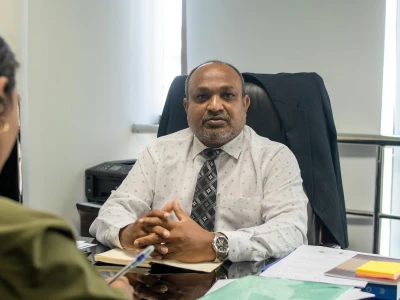
Addicts on streets enrolled in treatment programme, NDA says
He added that some people, who were earlier cut off from their family, are now seen reconnecting with the family and spending time with their children.
The National Drug Agency (NDA) on Monday said that people who are found in public places in inebriated states are being enrolled in the national drug treatment programme.
In the streets and public areas, intoxicated people and drug addicts eat, sleep and live outdoors. The problem was compounded, especially during the Covid pandemic and the lockdown.
On Sunday, pictures of people sleeping in a public areas went viral on social media once again.
When contacted, NDA chairman Shamau Shareef told Atoll Times on Monday that the pictures circulating on social media had come to the notice of the NDA as well and now they have started their treatment process.
"Whenever such an issue comes up, the NDA takes it up as soon as possible and talks to them and encourages them to participate in the treatment programme," Shamau said. He added that the process is being carried out in coordination with the police in case of any need for help.
Shamau said that special attention was taken during the fasting month to find people who were intoxicated on the road and treat them.
"Everyone who was visible to people on the road is now under treatment inside the system. Their progress has been good," Shamau said.
"People (who are on the streets like this) are usually thrown out of their families because of poor living conditions or because of various problems or because they consume drugs."
By reuniting such people with their families, the NDA provides ways to complete the treatment programme at home with the support of the family, Shamau said. If it is not possible to continue, it can be treated in a rehabilitation centre or some other place where housing can be provided, he said.
Shamau said people living in public places in an inebriated state "cannot be left behind anymore".
Shamau, however, noted that some people in the treatment program go out on their own from a particular point and go back to the streets. Pointing out that treatment can be carried out only if the person also wants it and tries to recover, he said that for the person who leaves in such a way there is no way to force them back.
"We are getting into treatment by motivating people, talking to them and encouraging them. Then those who leave are once again brought back via our outreach programme, motivated and brought back to treatment," he said.
'Treatment streamlined; will take time for results to show'
Shamau believes that in the past, the NDA's treatment programmes have not been based on the poor quality of life due to alcohol and lacked proper treatment for street dwellers.
However, Shamau said, "We are looking at the results rather than the number [of those who can be treated] now."
Late last year, Imad Solih was appointed as the CEO, which had been lying vacant for six months, to improve the functioning of the NDA and the process of changing treatment programs began.
After staff adapted to changes and training people, treatment began in January with new changes. Thus, Shamau pointed out:
-
Instead of a specific template, treatment for a specific period of time, treatment is now based on the individual needs of the addict after an assessment.
-
Make sure that when people are released after treatment, they are in a position to reconnect with the community.
-
Left to the community only after checking that there are proper ways to earn food, shelter and income.
-
In addition to addiction, other health issues are now addressed under the treatment program.
-
Help find a job by learning the technical skills they need to find a job.
-
Strengthening relationships with family is now a priority in the treatment program.
"The results (of these changes) are already noticeable. Previously, at the women's rehabilitation centre, no one remained until the treatment program was completed. They all leave. But we still have all the participants in the programme that started recently. They are now in the condition to return to the community," Shamau said.
He added that some people, who were earlier cut off from their family, are now seen reconnecting with the family and spending time with their children.
Shamau said the current programmes would yield positive results. However, it will take some more time for the community to see it, he said.
"Community acceptance is very important in this. The world succeeded in places where stigma was removed," Shamau said.
When asked if the NDA has the capacity to provide adequate treatment to all those involved in programmes, Shamau said:
-
Now, the NDA is trying to treat more than building facilities, and there are many ways to treat them.
-
Currently, the maximum number of people who can be accommodated in treatment centres are being treated.
-
Not everyone needs to be kept in a centre; so far treatment is manageable.
-
Even without the direct involvement of the NDA, H.Dh. Kulhudhuffushi Hospital is conducting a treatment program in collaboration with the island council
"The priority right now is to build treatment facilities in such a way that every healthcare facility provides an option for treatment. We are training people and building relationships," Shamau said.
At a time when the drug problem is rampant in the country, the NDA is the main agency set up to treat drug addicts and bring them back into the society.
The NDA has been in the process of restructuring the treatment programme since late last year after facing criticism from the public for its poor functioning.



